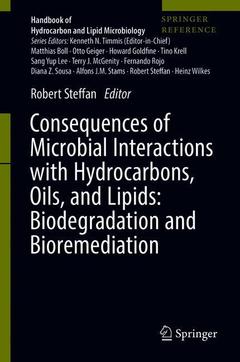Consequences of Microbial Interactions with Hydrocarbons, Oils, and Lipids: Biodegradation and Bioremediation, 1st ed. 2019 Handbook of Hydrocarbon and Lipid Microbiology Series
Langue : Anglais
Coordonnateur : Steffan Robert J.

In this book international experts discuss the state-of-the-art in the biological degradation of hydrocarbons to meet remedial or disposal goals. The work focuses on practical applications, often on globally important scales including the remediation of some of the world?s largest crude oil spills. Other related chapters discuss important implications of microbial transformation of hydrocarbons, including treatment of high fat processing wastes, impacts of microbial biodegradation activity on industrial processes, and the implications of microbial oil degradation in relation to modern oil extraction processes like hydraulic fracturing of shales and extraction of oil sands.
Biodegradation and Bioremediation: An Introduction;- Developing Bioremediation Technologies for Commercial Application: An Insiders View;- Utility of Industrial Experimental Sites for Developing Analytical, Monitoring, and Remediation Technologies;- Bioremediation of Marine Oil Spills;- Oil Biodegradation in Deep Marine Basins;- Biostimulation Strategies for Enhanced Bioremediation of Marine Oil Spills Including Chronic Pollution;- Weathered Hydrocarbon Biotransformation: Implications for Bioremediation, Analysis, and Risk Assessment;- Role of Biosurfactants;- Plant-Endophyte Partnerships to Assist Petroleum Hydrocarbon Remediation;- Removal of Hydrocarbons and Other Related Chemicals Via the Rhizosphere of Plants;- Natural Attenuation of Hydrocarbon Compounds in Groundwater;- In Situ: Groundwater Bioremediation;- Microbiology of Oil- and Natural Gas-Producing Shale Formations: An Overview;- Cometabolic Bioremediation;- Anaerobic Biodegradation of Hydrocarbons: Metagenomics and Metabolomics;- Genomic Response of Pseudomonas putida to Toluene;- Biodegradation of Ether Pollutants;- Plastic Biodegradation: Challenges and Opportunities;- Determination of Kinetic Parameters and Metabolic Modes Using the Chemostat;-
Dr. Robert J. Steffan received his Ph.D. in biology from the University of Louisville, where he worked on the development of molecular biological tools for monitoring genetically engineered microorganisms in the environment. His work included the first ever application of the polymerase chain reaction (PCR) for monitoring organisms in environmental samples. This early work provided a basis for much of the PCR-based environmental analysis in use today. Following his doctoral studies, he received an Alexander von Humboldt fellowship to perform postdoctoral research at the National Institute for Biotechnology (GBF) in Braunschweig, Germany. There, he worked to identify and genetically engineer biodegradation pathways in bacteria and to evaluate genetic transformation of bacteria in nature. After his postdoctoral studies, he worked in the environmental industry for more than 25 years, where he served as a technical expert to help solve real-world remediation and pollution treatment challenges, and also led a research and development group. His primary research interests were biodegradation of chlorinated solvents and ether-containing pollutants (1,4-dioxane, MTBE, BCEE, etc.), bioaugmentation for remediation, development of novel remediation strategies, and molecular biology of degradative bacteria. He directed the development and commercialization of SDC-9TM, a Dehalococcoides sp.-containing bacterial culture that has been applied at more than 2000 sites for remediation of chlorinated solvent contaminated groundwater. In addition, he led a program that developed a novel patented combinatorial biocatalysis process that resulted in the production of several unique and patented antibiotic compounds with activity against Gram-positive microorganisms including multidrug resistant TB. He has authored more than 100 scientific papers, reports, and book chapters, including two invited review articles in the Annual Review of Microbiology, and has received 11 patents. He has ser
International experts discuss the state-of-the-art in the treatment and remediation of oil spills and groundwater pollution and other practical real-world applications of the ability of microorganisms to biodegrade hydrocarbons A state-of-the-art review of practical approaches for utilizing microorganisms for treating and remediating hydrocarbons, including the treatment of some of the world’s largest crude oil spills. A comprehensive treaties on the practical applications of microorganisms for treating hydrocarbon wastes and pollution, and a discussion of the implication of hydrocarbon-degrading bacteria on real-world industrial processes
Date de parution : 08-2019
Ouvrage de 414 p.
15.5x23.5 cm
Thèmes de Consequences of Microbial Interactions with... :
Mots-clés :
Biodegradation; Bioremediation; Crude Oil; Shale Oil; industrial; Hydrocarbon Pollution; Groundwater
© 2024 LAVOISIER S.A.S.



